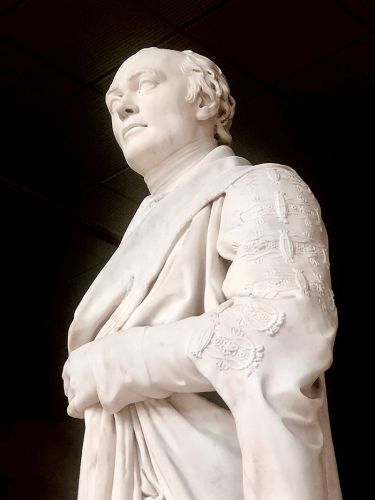28th April 2020
If you have ever walked past Northampton’s Guildhall, and seen a pale figure gazing out at the Derngate, you might have spotted the statue of Spencer Perceval, the only Northampton MP to lead the country as Prime Minister. He was also the only British Prime Minister to be assassinated in office, and his tale is a strange and sorry one.
In 1762 Spencer Perceval was born well connected. His mother was the granddaughter of the 4th Earl of Northampton, and he was named after his ancestor the Prime Minister Spencer Compton. His father, Lord Egremont was an advisor to King George and the Royal household. However, as the seventh son of sixteen children he was required to earn his own living, and he chose to enter the Law.
In his twenties, Perceval fell deeply in love with his older brother’s sister-in-law, Jane. He was not sufficiently established to be approved by her family, so in 1790 the couple eloped on her twenty-first birthday. Luckily Perceval’s career flourished. After training at Lincoln’s Inn, he became a barrister, and then one of the youngest ever King’s Counsel. His career provided a very necessary salary, required to provide for his growing family as he and Jane went on to have six boys and six girls.
As Perceval’s legal career developed, so did his interest in politics. His rise to political greatness seemed inevitable, and at the age of 34 he had the opportunity to serve Northampton as MP. His cousin had held the seat until 1796 until his elevation to the peerage as Earl of Northampton. Perceval took his cousin’s seat, and continued to represent the town until his assassination sixteen years later.
Perceval’s abilities were obvious, and his rise was fast. He became Solicitor General, and then Attorney General, then Chancellor of the Exchequer, and Leader of the House. His conservative, philanthropic and reforming Anglican stance inspired him to write pamphlets encouraging moral behaviour and family values, and critical of those who abused their power. He notably supported William Wilberforce in his campaign for the abolition of slavery.
Perceval’s career reached its peak in 1809 when he became Prime Minister. Despite difficult times, his ministry did well, reducing the National Debt whilst simultaneously funding the Duke of Wellington’s successful campaign against Napoleon. Perceval also managed to tread a delicate political path during the constitutional crisis surrounding George III’s illness and the subsequent Regency negotiations, despite suffering the Prince of Wales’s obvious disdain.
However Perceval’s life came to a sudden and unexpected end because of an situation he was only indirectly responsible for.
John Bellingham, a merchant trader from Liverpool had visited Russia on business in 1804, and the subsequent years had been a personal disaster. He was involved in accusations of fraud and debt, and then annoyed the Russian authorities. After he failed to impeach the Governor General, he was imprisoned, then left destitute on the street, but without permission to leave Russia and go home. The British Ambassador did nothing to help him, and it took an appeal to the Tsar before Bellingham was allowed home five years later. Once back home he was obsessed with the thought of receiving compensation for his injustices, lobbying anyone and everyone. All of his appeals for assistance and justice fell on deaf ears, and no one was prepared to do anything to help.
In April 1812, a Foreign Office civil servant said that he could do nothing, but suggested that Bellingham was free ‘to take whatever measures he thought proper’. This remark proved fatal for Perceval.
Bellingham purchased two pistols, and had a tailor alter his coat to take them. Three weeks later, Bellingham visited Parliament, and waited quietly in the lobby. When Spencer Perceval entered, Bellingham calmly stepped forward, produced his pistol and shot him in the heart. He was immediately arrested, charged and convicted. Bellingham insisted that he was justified in killing the representative of his oppressors, although he did remark that he would rather have shot the British Ambassador to Russia.
Bellingham’s court statement revealed that he considered that the upper ranks of society acted in their own interests without impunity, setting themselves above the law, and that the assassination of Perceval should be a lesson to all future ministers.
A week after the assassination, Bellingham was hanged in public, but was considered by many to be a hero of the downtrodden and oppressed. His wife and children received a generous public subscription, ensuring their future financial security.
Spencer Perceval had died with comparatively little in the bank, so Parliament granted his children £50,000.00 from the public purse, with extra allowances for his wife and oldest son.
Perceval was mourned by many as a hardworking man of principle. He was not a flamboyant man, or a stand-out leader, but one who through careful management led the country through difficult financial and political times. His memorials include the statue now housed in our Northampton Guildhall. This work by Sir Francis Chantrey was completed in 1817 and reflects the physical descriptions of him during his life-time, as a slight and very pale man, with a kindly disposition.
And he gazes still upon the town he represented for sixteen years. We should remember him for his sacrifice, and hope that our politicians today reflect upon the lessons learned.
For more information, read ‘Why Spencer Perceval had to die’ by Andro Linklater
Your login details have been used by another user or machine. Login details can only be used once at any one time so you have therefore automatically been logged out. Please contact your sites administrator if you believe this other user or machine has unauthorised access.








